I really like voting. I don’t know why, but this formal act as a citizen makes me feel proud of being part of the community and that “I have something to say”.
really like voting. I don’t know why, but this formal act as a citizen makes me feel proud of being part of the community and that “I have something to say”.
As a French citizen living in Germany during my childhood, I remember very well taking the car to the consulate in Düsseldorf (a thirty minute drive) and then queueing for ages before seeing my parents vote. We weren’t much in contact with other French families at that time, so seeing other French people like me living in Germany was quite exciting.
This morning I went to vote; here in Britain for the local elections, it was just around the corner. I was so excited to vote that I went yesterday, and my husband had to rain on my political parade by telling me that the elections were the next day.
This morning I went to vote and it was different than usual. Continue Reading
An Easter Lamb in a rucksack and ringing the bells in Barcelona
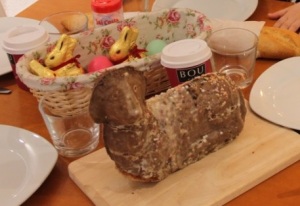 It’s not just about language! You know how I get on my soap box when it comes to multicultural families. People so often continually ask questions about your kid’s ability to juggle with two (or more) languages; how they talk to you, converse with their school mates or their grandparents or even their siblings – important questions, I agree. But what interests me above all is what do I bring from my childhood, from my home-culture and want my own children to experience, to do and to celebrate? There is definitely not just the language but indeed, cultural heritage as well!
It’s not just about language! You know how I get on my soap box when it comes to multicultural families. People so often continually ask questions about your kid’s ability to juggle with two (or more) languages; how they talk to you, converse with their school mates or their grandparents or even their siblings – important questions, I agree. But what interests me above all is what do I bring from my childhood, from my home-culture and want my own children to experience, to do and to celebrate? There is definitely not just the language but indeed, cultural heritage as well!
Easter provided us with fantastic lesson on that front. As a Franco-German family living in Britain our holidays took us this year –not as usual back to our families- but to a different country. We took the train to leave the island under the channel, past through many different landscapes in France, to finally exit the train at our final destination: Barcelona. How exciting: a new city to explore, a new language to try, a new gastronomy to savour and last, but not least, alternative weather conditions to experience.
A few weeks prior our trip we talked about how we could possibly celebrate Easter, “far away from home”? I brought from my own Christian childhood memories of the recipe for a lamb-cake and my husband could not imagine having Easter without colouring eggs (which by the way is a hassle in Britain, as most of the eggs are brown!) and both of us love the quantities of chocolate collected during an Easter Egg hunt in the garden. Great, but how can we transfer this to a 30m2 flat in central Barcelona with no oven and no garden? Our parental decision was rapid, as we wanted our children to know what goes on at Easter in both of our home-cultures so we allowed some space for that in our luggage. Continue Reading
Between rain and snow: on a journey towards my book
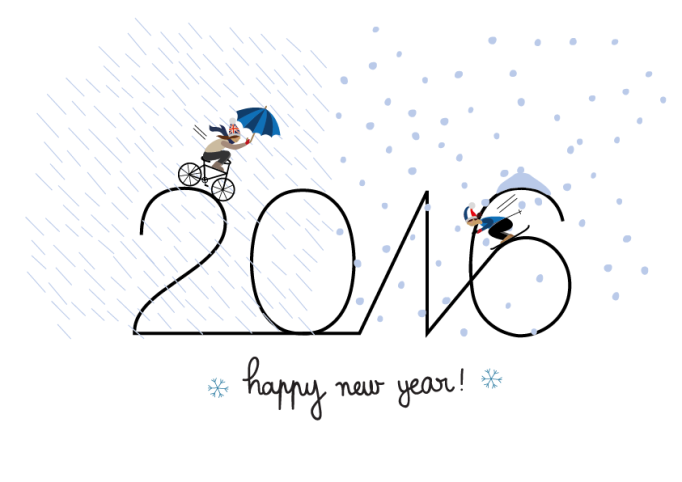 In April 2014 I was in the starting blocks for my first interviews with bicultural couples. Now, thirty-something meetings later, I have a massive bunch of stories, quotes and comments. They come straight from the daily life of multicultural parents, highlight their experience and show how diverse and personal their upbringing style is. Bringing Up Children between Cultures is the working title of my book project. You can follow the up and downs of my writing journey, and also read some very exciting insights from the parents themselves on Twitter: #FamBtwCultures
In April 2014 I was in the starting blocks for my first interviews with bicultural couples. Now, thirty-something meetings later, I have a massive bunch of stories, quotes and comments. They come straight from the daily life of multicultural parents, highlight their experience and show how diverse and personal their upbringing style is. Bringing Up Children between Cultures is the working title of my book project. You can follow the up and downs of my writing journey, and also read some very exciting insights from the parents themselves on Twitter: #FamBtwCultures
What started as conversations, interviews and meetings with couples and single parents is becoming a book! A book about multicultural parenting, about the pros and cons of raising children between different languages and cultures, about everyday stories that may inspire you and be a starting point for thoughts and conversations with your partner, friends and other families. Continue Reading
Meeting Leone
It was one of these days, when the World Wide Net trapped me. Swinging from one lane to another, exploring, discovering new webpages, mainly blogs full of amusing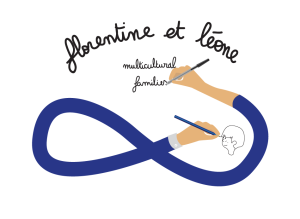 or sad stories. Time was passing, but (as usual for a French who loves “vivre l’instant present”) I didn’t notice it. And then, all of a sudden, I saw some great illustrations. Well designed, clear lines with awesome humor. I loved it from the first page. And the title: Cornichons et Compagnie – Pickles and other stories. How lovely! I don’t have to mention that I have a voracious appetite and I read almost the entire blog.
or sad stories. Time was passing, but (as usual for a French who loves “vivre l’instant present”) I didn’t notice it. And then, all of a sudden, I saw some great illustrations. Well designed, clear lines with awesome humor. I loved it from the first page. And the title: Cornichons et Compagnie – Pickles and other stories. How lovely! I don’t have to mention that I have a voracious appetite and I read almost the entire blog.
A few months later, I was lucky enough to meet the person behind these great illustrations: Léone! A mid-twenty something creative girl living in Switzerland, teaching art in French and loving Britain where she lived and worked a few years ago. In the heat of Lyon, in front of us two huge salads, that was it: we talked about “God and the world” (“Über Gott und die Welt sprechen,” like the Germans say), we “put the world to rights” (“refaire le monde,” like the French say)… And two hours later a creative and exciting collaboration was born: Leone will draw the illustrations for the book “Bringing Up Children between Cultures”.
It’s amazing that sometimes it’s more than useful to get lost in the World Wide Web. I am so glad that I discovered Leone and glad that we can work together between England, France and Switzerland.
The book project is on its way. It’s getting serious – how exciting!
Don’t forget to follow the adventure on @oxfrognews and especially with #FamBtwCultures.
Say “YES!” to a multiculti wedding!
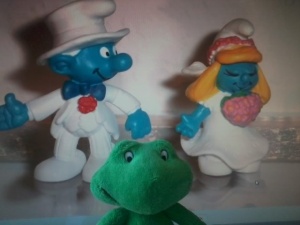 Do you know why I married her? teased Johannes his Franco-German wife Apolline whilst chatting with friends. Because she is bicultural and speaks another mother tongue, her voice sounds slightly different in each language, and she behaves differently as well. It’s like I have two brides in one, that’s the mystery of bi-cultural couples. Let’s hope that this is not the only reason!
Do you know why I married her? teased Johannes his Franco-German wife Apolline whilst chatting with friends. Because she is bicultural and speaks another mother tongue, her voice sounds slightly different in each language, and she behaves differently as well. It’s like I have two brides in one, that’s the mystery of bi-cultural couples. Let’s hope that this is not the only reason!
Usually weddings, even if they take place in one country with people from the same town, are quite tricky. The expectations are different from family to family and make the plans difficult. In a bicultural wedding the differences are exacerbated: two or more cultures, languages, relatives abroad, various customs. It looks like a never-ending headache.
But this should not stop you from a multicultural marriage! The people I met to talk about their bicultural life remember their wedding with pleasure!
One or two countries?
It often occurs that bicultural couples have two weddings in each of their home countries. Continue Reading
Cross-cultural happiness on your Birthday
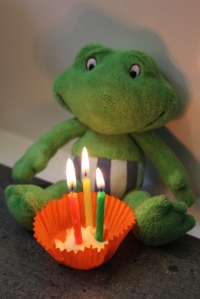 “I can’t sleep, I am sooo excited, tomorrow is my friend’s birthday” giggled my daughter last Friday evening. Since she got her invitation in her pigeonhole at her preschool she has been counting the days, the hours, to go to this young man’s forth birthday. “He told me that there will be a bouncy castle, and cake, and crisps and juice and sweets… hey, maman, when can I go?” pleaded my daughter the next morning three hours before leaving the house, already dressed in her festive clothes and jumping around like a jack-in-the-box. I love watching this excitement and, how lovely it is to observe this pure childhood happiness about birthdays. We are in May and she is also already preparing for her birthday in September…
“I can’t sleep, I am sooo excited, tomorrow is my friend’s birthday” giggled my daughter last Friday evening. Since she got her invitation in her pigeonhole at her preschool she has been counting the days, the hours, to go to this young man’s forth birthday. “He told me that there will be a bouncy castle, and cake, and crisps and juice and sweets… hey, maman, when can I go?” pleaded my daughter the next morning three hours before leaving the house, already dressed in her festive clothes and jumping around like a jack-in-the-box. I love watching this excitement and, how lovely it is to observe this pure childhood happiness about birthdays. We are in May and she is also already preparing for her birthday in September…
Is the birthday celebration also touched by culture and different expectations? I am afraid so, yes! Talking with parents about their style of upbringing between cultures makes me realise how variable the meaning of this day can be. The French, for example, don’t mind if you congratulate them two days later or even one week before your actual birthday. This behaviour is unthinkable in Germany. Continue Reading
Sharing is caring
I don’t know about you, but at home we have some funny quotes we love to repeat. One of them is “sharing is caring” (with a particular long “aaaa”) which reminds us of a particular Dad in a Eurostar who couldn’t stop chanting this phrase to his two year old daughter. Despite the fact that sharing is an incr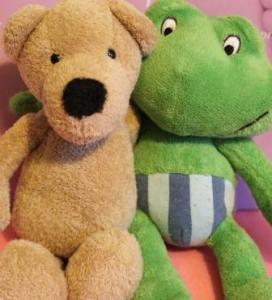 edibly difficult process for a toddler (compared to if we had to learn Russian in two days), he patiently persisted (with this message).
edibly difficult process for a toddler (compared to if we had to learn Russian in two days), he patiently persisted (with this message).
Don’t worry, this is not one of my crusades upon the British style of upbringing! I am serious, I want to give a huge compliment to this particular thing I love in my new country. People are caring.
Sure, I did notice it whilst exploring various charity shops – a fabulous concept which is a big step up from just a second-hand shop, as you give your things away for a good cause! Or surfing on the Freegle website. Did you know that Freegle is British? Their idea: building an internet-based service where you can offer things for free or ask for things others may not want to use anymore.
As a family we are particularly interested in all children-related stuff: clothes, books, some toys… so we also like bagging a bargain during “Nearly New Sales” from schools or the NCT (read more here), a very well organised and planned event which gives you the opportunity to shop second-hand and sometimes as new!
But the kindness and the caring character, which I have discovered more over the last few months, is free and practically brought to your doorstep. “I like this British custom to give things away you don’t need anymore” confides my Italian neighbour to me last week. She came around with a bag full of unused nappies, wondering if our little one could use them. It made my day, not the nappies, of course, but this shared generosity; because when somebody gives you something for free, one day you will do the same and, in so doing, sow a bit of happiness.
First Birthday candle for my book
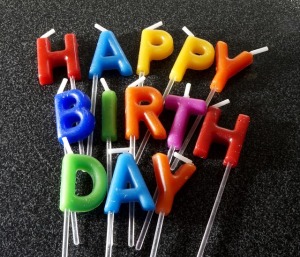 Sometimes it’s worth just briefly pausing to think about what we have done with all our time. The book project about bicultural families started at the end of April 2014. More than 200 miles, a huge amount of anecdotes, loads of laughter, one puncture and a long walk home, several nuts, home-made bread slices and other nibbles later, I am amazed about where this book brought me to. With the parents I traveled to Trinidad and Tobago, Brazil, China, (…), Israel, the United States, the Netherlands, Chile and of course France, Germany, Spain and finally Britain, Wales and Ireland!
Sometimes it’s worth just briefly pausing to think about what we have done with all our time. The book project about bicultural families started at the end of April 2014. More than 200 miles, a huge amount of anecdotes, loads of laughter, one puncture and a long walk home, several nuts, home-made bread slices and other nibbles later, I am amazed about where this book brought me to. With the parents I traveled to Trinidad and Tobago, Brazil, China, (…), Israel, the United States, the Netherlands, Chile and of course France, Germany, Spain and finally Britain, Wales and Ireland!
Thanks to all the Mums and Dads for their time and kindness of sharing their experience with me, giving me a glance of their adventures between their cultures with their kids. I feel honoured to write about them – and with them – these pages full of life, ideas and perspectives on a challenging topic: the transmission of our home-culture to bring up children as citizens of the world.
My fingers aren’t tired of typing about such amazing stories and experiences and I do my best to write quickly. There are still some subjects I want to explore more in depth, so if you want to take part in this project, drop me an email and hope to meet you soon.
Florentine
How do you say “hello”?
 Are you familiar with that particular kind of hesitation when you meet someone and there is this first embarrassing contact: a kiss, a hug or a handshake? Whether it is at school, or whilst shopping or even when you have people for dinner, these first minutes are a little dance between a step forward to embrace them, a step backwards; maybe they prefer a handshake, but firm or gentle? Or finally is a “hi” is sufficient? Even if I like joking about this topic, I have to admit that I am lost between cultures. And I am only moving between three of them (French, German and British). What about you? What are you used to? What do you do when you live in another country?
Are you familiar with that particular kind of hesitation when you meet someone and there is this first embarrassing contact: a kiss, a hug or a handshake? Whether it is at school, or whilst shopping or even when you have people for dinner, these first minutes are a little dance between a step forward to embrace them, a step backwards; maybe they prefer a handshake, but firm or gentle? Or finally is a “hi” is sufficient? Even if I like joking about this topic, I have to admit that I am lost between cultures. And I am only moving between three of them (French, German and British). What about you? What are you used to? What do you do when you live in another country?
Talking to bicultural couples (read more about my project here) I remember a Thai-British couple who describes how different the codes are in Thailand. Continue Reading
Multicultural families, what’s on the menu tonight?
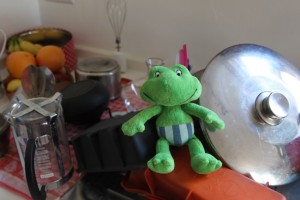 This question might sound funny, but believe it or not, lots of interviewees realised during our encounter how much of their childhood memories are related to food, an interesting point, especially when you grew up in a country which is not your actual country of residence. The memory of a special dish, of its taste and the related atmosphere, a birthday, for example, or a Sunday morning extravaganza, or even the only dish your father could prepare… makes you feel nostalgic and shows you how much your own culture nourishes you. It’s worth remembering to integrate gastronomy in a multicultural upbringing as it’s part of the cultural transmission. And food offers a fantastic vast field! You can share the joy of cooking traditional dishes, exploring some home-recipes and tracking down some ingredients from your own country.
This question might sound funny, but believe it or not, lots of interviewees realised during our encounter how much of their childhood memories are related to food, an interesting point, especially when you grew up in a country which is not your actual country of residence. The memory of a special dish, of its taste and the related atmosphere, a birthday, for example, or a Sunday morning extravaganza, or even the only dish your father could prepare… makes you feel nostalgic and shows you how much your own culture nourishes you. It’s worth remembering to integrate gastronomy in a multicultural upbringing as it’s part of the cultural transmission. And food offers a fantastic vast field! You can share the joy of cooking traditional dishes, exploring some home-recipes and tracking down some ingredients from your own country.
Tania, a German mother now living in Britain, shared that her parents sent her „foodparcels“ during her studies with some German specialties, such as Lebkuchen and Marzipan… „I loved it as you can’t find them in Britain, it was like being at home when I closed my eyes.“ Continue Reading

